Edie Melson's Blog, page 53
May 3, 2024
The Backstory Dilemma for Writers
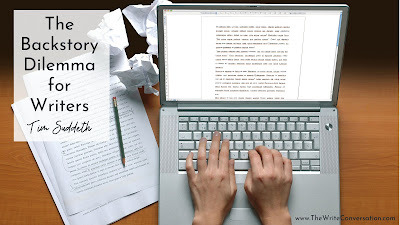
by Tim Suddeth @TimSuddeth
This week I read a novel that had all the necessary ingredients to keep me reading past my bedtime. (The ultimate compliment to a writer.) Instead, I had to force myself to finish. (Oops.)
The intriguing characters were there. The setting invited you in. The plot was unique and engaging. It even had a dog.
But the writing, not so much. And the problem boiled down to one thing: too much backstory. Backstory is what had happened to the characters before this story began. And backstory is important. Let’s face it, the more interesting a character’s life, the better the story. The issue comes when so much backstory is dumped in the narrative that it takes the reader out of the action.
This book had pages of narrative, a great deal of it interesting. But I often found myself wondering why the author wanted to reveal this now? It didn’t seem key to the plot.
Here’s a hint: if you have something you must tell the reader from your research, don’t. We’re there for the story. Trust your storytelling skills. Sprinkle the good stuff lightly throughout the entire story. Only sprinkle as needed. The less backstory you share, the better. Because it’s this story that’s important.
And if you’re more taken with the backstory than the current action, maybe you’re telling the wrong story. You could be starting in the wrong spot.
Think about it like this. When you meet someone new, it’s like starting on page one. I had a guy join my bowling team this season. We met right before our first game. We didn’t share where we grew up, where we went to school, or about our first job. Instead, we started bowling, started the action. Some dialog, but the dialog centered on what was going on around us. Maybe we talked about mutual friends. But we didn’t spend our time talking about our pasts. The same goes with the characters in our stories. The gradual learning about the characters, the sprinkling of their backstory, adds to the mystique. It can even add to the tension.
As writers, we also shouldn’t withhold important information without a good reason. If we have a story of two people hiking through the woods, when one stumbles and hurts his ankle, this isn’t the time to reveal that his companion is an EMT. As writers, we might enjoy surprising the reader. But in most genres, you’ll only leave your reader feeling cheated.
The writer can easily fix this. Just mention earlier that she’s wearing a tee shirt from the fire department, or have them discuss her partner, who happens to be his brother. One sentence. You don’t have to go into a bunch of details. And definitely don’t have a paragraph that runs more than half a page.
Where are the best places to sprinkle in backstory? We’ve already mentioned dialogue. We can also put it in their thoughts, their memories. Think about how memories work. I have a terrible memory. I can’t just bring up the names of people I’ve met. Something needs to jog my memory. Seeing someone’s face. Talking about someone entirely different may bring another classmate to mind.
Do this in your story. A car can spur memories of the character’s father or old boyfriend. The smell (Smells are great at bringing on memories.) of a cobbler cooking might bring back memories of grandparents or family reunions. But use only a sprinkle. Just enough to get the information to your readers without taking them out of the current action.
A recent Bible Study showed me how this works in our faith journeys. When we accept Christ, there is so much about God and faith that we don’t know. Learning the Bible could take several lifetimes. When you become a believer, God doesn’t suddenly do a mind dump, or a Vulcan mind meld, and gives you all the information about Him you’ll ever need. He reveals Himself through the journey we call life. Through the hurts and the pains, the joys and the acts of love, we see Him and learn about Him.
There will come a time when we’ll be able to look back and see how our stories interlaced with His-story throughout history. A tapestry. A masterpiece. Just the way we want our readers to remember our stories.
What are your tips for adding backstory that strengthen your writing?
TWEETABLE (read note below)The Backstory Dilemma for Writers from @TimSuddeth on @EdieMelson (Click to Tweet)
NOTE: CLICK to TWEET is throwing an error code again, so here's the original tweet you can copy and paste into social media:
The Backstory Dilemma for Writers from @TimSuddeth on @EdieMelson https://thewriteconversation.blogspot... #writing #writingtips
 Tim Suddeth is a stay-at-home dad and butler for his wonderful, adult son with autism. He has written numerous blogs posts, short stories, and three novels waiting for publication. He is a frequent attendee at writers conferences, including the Blue Ridge Mountain Christian Writers Conference and a member of Word Weavers and ACFW. He lives near Greenville, SC where he shares a house with a bossy Shorky and three too-curious Persians. You can find him on Facebook and Twitter, as well as at www.timingreenville.com and www.openingamystery.com.
Tim Suddeth is a stay-at-home dad and butler for his wonderful, adult son with autism. He has written numerous blogs posts, short stories, and three novels waiting for publication. He is a frequent attendee at writers conferences, including the Blue Ridge Mountain Christian Writers Conference and a member of Word Weavers and ACFW. He lives near Greenville, SC where he shares a house with a bossy Shorky and three too-curious Persians. You can find him on Facebook and Twitter, as well as at www.timingreenville.com and www.openingamystery.com.
Published on May 03, 2024 22:00
May 2, 2024
Genre Expectations: Writing Magical Realism and Contemporary Fantasy
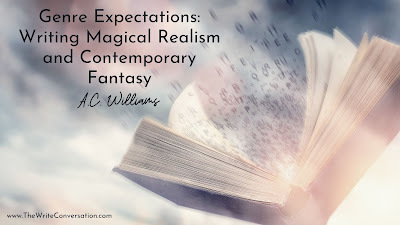
by A.C. Williams @ACW_Author
Genres are confusing, guys. Let’s just say it. It used to be so much easier when the categories of fiction were ones with magic and ones without magic. Or spacey stories versus scary stories. That being said, the explosion of genres really does help narrow down the types of stories that audiences want to read. Since there are so many books, it’s necessary to have more ways to categorize them.
So today we’re going to talk about two genres that often get confused: Magical Realism and Contemporary Fantasy. It’s easy to mix these two up because they have many similar tropes and traits, but they are very different, especially in how you market them.
Basically, if you have written a contemporary (or modern) fantasy and you market it as magical realism, you’re going to disappoint a lot of readers. You’ll probably get negative reviews. You may even alienate future readers as a result. And the same is true if you’ve written magical realism and marketed it as contemporary fantasy.
First, let’s talk very briefly about how they’re the same. I always find it useful to understand why two genres are often mistaken for each other in order to explain the differences to people.
In this case, both magical realism stories and contemporary fantasy stories take place in a modern setting. Well, most of the time. Let’s say, modern-ish. They both include magical or fantastic elements that are part of everyday life, usually in alignment with modern technology. And, in most instances, they focus on the relationships between the characters and rely less on extensive worldbuilding than other fantasy genres (obviously, because it takes place in the “real world” and doesn’t need a lot of excess explanation and setup).
That’s how they’re the same; how are they different?
Well, first of all, magical realism is usually written in a literary style. Maybe this is wrong of me to say, but my “quick and dirty” definition of magical realism is that it’s fantasy for the literature professors. Fine literature has its own unique feel and mood in the industry. There’s a high focus on vocabulary, and generally speaking within the text itself, the story is structured with larger paragraphs. It moves more slowly than books that would not be considered literary.
Magical realism as a genre can be set in modern-day society, or it can be set in a historical timeframe. It depends on the type of story the author is telling. One of the best examples of magical realm is Beloved by Toni Morrison, which is set during the era right after the Civil War. A popular example of magical realism is The Green Mile by Stephen King. There are others, of course, but those are the options that give the best sense of the genre.
They take place in a modern-ish setting, and they feature one or two fantastic elements that play a role in the story, but the rest of it is primarily focused on the characters and the social issues of the time.
To be transparent, I don’t read a lot of magical realism. It usually doesn’t resonate with me as a reader, and it often deals with social issues and topics that aren’t as interesting to me. In the last couple of years, though, I’ve reviewed several magical realism manuscripts in the Christian market that were really great. Surprisingly great. So I have high hopes for the genre moving forward.
Now, as you might expect, contemporary fantasy is different from magical realism because it doesn’t just have one or two fantastic elements in the story. It has many, and they are all essential in moving the story forward.
I have a lot more examples of contemporary fantasy than I do of magical realism, again because I prefer contemporary fantasy. Some of the most recognizable contemporary fantasy books would be the Twilight books, the Harry Potter series, the Percy Jackson series, the list goes on and on.
One series that technically falls under contemporary fantasy is the Dresden Files by Jim Butcher, but what’s unique about this book series is that it is urban fantasy. Urban fantasy is a specific subgenre of contemporary fantasy (and we’ll talk more about that next time).
In each of these examples, the story is set in modern day, contemporary locations. Washington state. London. Chicago. But within each of these familiar, modern-day settings, there is a shadow world or an unseen world or parts of the cities that are not accessible to everyday people. Within those hidden worlds, the culture is completely different.
Whether you’re talking about Stephenie Meyers’s sparkly vampires or J.K. Rowling’s wizard schools or Rick Riordan’s Camp Half-blood—they are all functional societies apart from what is recognizable in our everyday world. And the story can’t move forward without the fantastic elements associated with them.
So, if you want to write magical realism, make sure that your fantasy/magic elements are subtle and a small part of the literary-style story you’re telling. If you want to write contemporary fantasy, you’ll have to do a little bit of worldbuilding to create a fantasy society that exists within the world we already know, and it will need to play a role in all your major plot points.
TWEETABLEGenre Expectations: Writing Magical Realism and Contemporary Fantasy from @ACW_Author on @EdieMelson (Click to Tweet)
Don't Miss the Previous Posts in This Series1. Writing Romantic Fantasy and Fantasy Romance2. Writing Fantasy and Space Opera3. Writing Steampunk and Gaslamp4. Writing Magical Realism and Contemporary Fantasy
 Award-winning author, A.C. Williams is a coffee-drinking, sushi-eating, story-telling nerd who loves cats, country living, and all things Japanese. She’d rather be barefoot, and if she isn’t, her socks won’t match. She has authored eight novels, two novellas, three devotional books, and more flash fiction than you can shake a stick at. A senior partner at the award-winning Uncommon Universes Press, she is passionate about stories and the authors who write them. Learn more about her book coaching and follow her adventures online at https://www.amycwilliams.com.
Award-winning author, A.C. Williams is a coffee-drinking, sushi-eating, story-telling nerd who loves cats, country living, and all things Japanese. She’d rather be barefoot, and if she isn’t, her socks won’t match. She has authored eight novels, two novellas, three devotional books, and more flash fiction than you can shake a stick at. A senior partner at the award-winning Uncommon Universes Press, she is passionate about stories and the authors who write them. Learn more about her book coaching and follow her adventures online at https://www.amycwilliams.com.
Published on May 02, 2024 22:00
May 1, 2024
How ELSE Does a Writer Unwind After a Deadline?
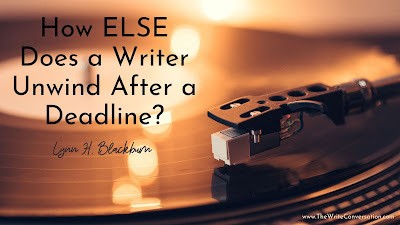
by Lynn H. Blackburn @LynnHBlackburn
Ideally, we would all hit send on our manuscripts and immediately retire to the locale of our choice. Perhaps a country estate, a mountain cabin, a beach house, or maybe even a yacht. In each of these environments, we would be served food and beverages, celebrated for our mammoth achievements, and encouraged to soak in the bliss of a job well done.
SCREEEECH.
That was the needle being scraped along the record of real life.
As I mentioned last month, the first seventy-two hours post-deadline are likely to occur in a haze of mental confusion, emotional exhaustion, and physical fatigue.
But then what?
How can we refill our depleted creative resources while also returning to regularly scheduled programming in our homes, with our families, and all our other myriad responsibilities?
As usual, I have thoughts.
1. Taking care of yourself post-deadline should never be seen as optional. We don’t expect a marathon runner to skip across the finish line and then head straight to work. Why do we expect it of ourselves as writers?
2. Taking care of yourself post-deadline doesn’t require spending a lot of money. It does require intentionality.
3. Taking care of yourself post-deadline is up to you. No one is going to do it for you. And before you start thinking that this is selfish, remember that you can’t be the spouse, parent, sibling, friend, employee, etc. that you want to be if you’re so frazzled you can’t think straight.
4. Taking care of yourself post-deadline is super personal. I’ll give you some tips and tricks, but ultimately, you’re the only one who can figure out what you need most. Making the effort to do this will help you in the long run.
So, how do we do this? Each idea below has a simple option and a splurge option. The splurge may or may not require money. Sometimes the splurge is in time.
Post-Deadline Self-Care for Writers
Simple—Sleep
Splurge—Sleep more
This one is the most obvious and also, shockingly enough, the one many of us ignore. But don’t ignore it! Your body heals, your mind resets, and your emotions recalibrate while you sleep. Sleep!!!
Simple—Stretch
Splurge—Get a massage
It costs nothing to stretch your neck and back. We should all be doing this regularly anyway, but post-deadline, it’s crucial to take care of those tight muscles. Most writers who want to make a career out of publishing are going to spend hours and hours sitting in front of a computer. Your neck, back, arms, wrists, and hips are just as much tools as your MacBook or your fountain pen. A simple internet search will give you stretches you can do at home. If a massage is in the budget, tell the therapist what you’ve been doing and that you need them to pay close attention to your neck, shoulders, and upper chest.
Simple—Everything shower
Splurge—Mani/pedi/Spa day
I’m not sure what the male equivalent of an everything shower is, so guys, you’ll have to extrapolate from what I’m about to say and do your own thing. Ladies, post-deadline is the time for an everything shower because we know it’s been a while since you did more than the bare minimum. Shave. Wash your hair. Wash it again. Deep condition. Use a face mask. Exfoliate. Slather yourself in a lotion that smells good. Dry your hair. If you use makeup, find it (because it may have been a while) and put it on. If you can afford it, treat yourself to a mani/pedi, or even better, a spa day. (Hint: If you have a deadline coming up, ask for gift cards to make this splurge a reality!)
Simple—Go for a walk
Splurge—Go for a hike or a walk on the beach
You NEED sunshine. You NEED fresh air. If you can get it in the mountains beside a waterfall, or barefoot on the sand with a salty breeze blowing your hair around, even better. You don’t have to set speed records. Just get outside and move your body.
Simple—Go on an artist date
Splurge—Get away for the weekend
I’m a big fan of artist dates year round, but I’m not sure there’s ever a more crucial time than post-deadline. This could be as big as going to a concert or as small as wandering around your favorite store. As I mentioned last month, there’s a very good chance that doing anything with words won’t work for you. Don’t panic if you can’t read right now. You’ve been immersed in words. Now is the time to fill your tank with other things. Pretty fabrics, lush yarns, gorgeous artwork, passionate performers of whatever type of music brings you joy, funny movies - those are the kinds of things you want to indulge in! You only need a few hours to do the simple version. If you can take off for the weekend? Even better!
Simple—Acknowledge the to-do list
Splurge—Ignore the to-do list
There’s not much that makes me more stressed than knowing I have a million things to do. So post-deadline, don’t fight that. Make the list. Get it out of your brain and onto a piece of paper or into your notes app. And then, if at all possible, ignore it for a day or two. It will still be there. I promise. If you can’t ignore it completely, ignore as much as you can. Do what must be done, but give yourself permission to rest!
If you’re going to make publishing part of your life, deadlines will also be a regular occurrence. Be gentle with yourself. You’ve worked hard! Now it’s time to take a break!
Grace and peace,Lynn
TWEETABLEHow ELSE Does a Writer Unwind After a Deadline? @LynnHBlackburn on @EdieMelson (Click to Tweet)
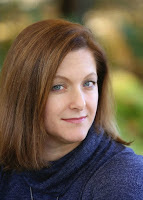 Lynn H. Blackburn is the award-winning author of Unknown Threat, Malicious Intent, and Under Fire, as well as the Dive Team Investigations series. She loves writing swoon-worthy southern suspense because her childhood fantasy was to become a spy, but her grown-up reality is that she's a huge chicken and would have been caught on her first mission. She prefers to live vicariously through her characters by putting them into terrifying situations while she's sitting at home in her pajamas! She lives in Simpsonville, South Carolina, with her true love, Brian, and their three children. Learn more at www.lynnhblackburn.com.
Lynn H. Blackburn is the award-winning author of Unknown Threat, Malicious Intent, and Under Fire, as well as the Dive Team Investigations series. She loves writing swoon-worthy southern suspense because her childhood fantasy was to become a spy, but her grown-up reality is that she's a huge chicken and would have been caught on her first mission. She prefers to live vicariously through her characters by putting them into terrifying situations while she's sitting at home in her pajamas! She lives in Simpsonville, South Carolina, with her true love, Brian, and their three children. Learn more at www.lynnhblackburn.com.
Published on May 01, 2024 22:00
April 30, 2024
Four Ways to Make Brainstorming Work for You as a Writer

by Sarah Sally Hamer @SarahSallyHamer
One of my favorite things to do, brainstorming is usually defined as a way to formulate new ideas from the creative side of our brain by allowing those ideas to flow.
Our brains are amazing, allowing us to coordinate thoughts and ideas based on our experiences. We get triggered, usually by an outside stimulus, and millions of brain cells start to vibrate. That stimulus finds cells which are all connected to a specific memory—an association and conglomeration of concepts about a specific thing—and causes a visceral response. In other words, the sight of a snake is going to bring up layers upon layers of associative memories about what your parents, your siblings, your teachers, your preachers, and your own experiences have led you to believe about snakes and your body will immediately react, usually either with interest or fear.
So, how does this help us with brainstorming our writing?
The beauty of brainstorming is two-fold: a) We can plumb the depths of our own brain to create characters and situations that leap off the page, and/or b), we can also get feedback from people who all have different experiences.
Imagine this scenario:
You're having problems with a character or a plot point. You've thought and thought and thought and you're still struggling. So, you call a friend. Or two. Around a table with a hot beverage you all start talking about the story line, utilizing the experiences and creativity of all of you. Soon, the ideas are flying, some great, some just silly. But, as you build on each other, perhaps something amazing will come out of it, something you can use to make your book work the way you want it to.
Now with all this information, how can we make brainstorming work better?()1. Pick people who help you to let go of at least some inhibitions. I find my long-standing critique group of dear friends help me the most. We find a table at a restaurant where we can giggle and get excited and make all the noise we want and go to it. Even strangers might have useful information—ask people what they think. Listen to folks around you as they tell their stories—sometimes, truth is indeed stranger than fiction. 2. I can also brainstorm on my own. I use the mind mapping program www.brain.com (they have a free level), a notebook, or even the back of a napkin to write down ideas. Start with a notion and come up with as many ideas as you can, even if they sound crazy!3. Just let the things flow. Don't censure anything. You may not use anything you come up with, but you may find a crazy idea that leads to the perfect one for your story.4. Don’t feel that you have to take even a single idea that comes up in a brainstorming session. It's not about specific situations, it's about loosening up your creativity and finding great ideas inside of you.
Bottom Line
The power of brainstorming is in the flow of creativity. In this crazy world of ours, all too often we get restricted by too many things going on and we can't let our minds wander. Remember, Burton Rascoe said: A writer is working when he’s (or she's) staring out the window. So I hope you can find a window to stare out of.
Do you brainstorm? How?
TWEETABLE4 Ways to Make Brainstorming Work for You as a Writer from @SarahSallyHamer on @EdieMelson (Click to Tweet)
 Sarah (Sally) Hamer, B.S., MLA, is a lover of books, a teacher of writers, and a believer in a good story. Most of all, she is eternally fascinated by people and how they 'tick'. She’s passionate about helping people tell their own stories and has won awards at both local and national levels, including two Golden Heart finals.
Sarah (Sally) Hamer, B.S., MLA, is a lover of books, a teacher of writers, and a believer in a good story. Most of all, she is eternally fascinated by people and how they 'tick'. She’s passionate about helping people tell their own stories and has won awards at both local and national levels, including two Golden Heart finals.A teacher of memoir, beginning and advanced creative fiction writing, and screenwriting at Louisiana State University in Shreveport for over twenty years, she also teaches online for Margie Lawson at WWW.MARGIELAWSON.COM. Sally is a free-lance editor and book coach, with many of her students and clients becoming successful, award-winning authors.
You can find her at info@mindpotential.org
From Sally: I wish to express gratitude to the giants upon whose shoulders I stand and who taught me so much about the writing craft. I would list every one, if it were only possible.
Published on April 30, 2024 22:00
April 29, 2024
Where Does a Writer Go for Reliable Tech & Publishing Industry Info?
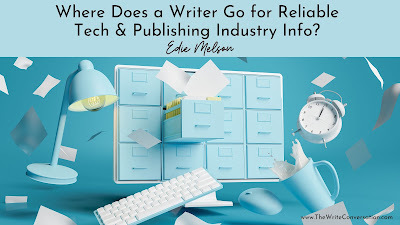
by Edie Melson @EdieMelson
I get asked this question a lot. There is so much information out there—and most of it incorrect or at least misleading—that we’re all afraid to just ask Google for help. So today I’m going to share some of the places I got to get information and verify the information I get.
Tech Info
The Current, Powered by Kim Komando. Hands down, my favorite newsletter for all things tech, come out daily from Kim Komando. I love her insight on what’s happening in the tech world for several reasons:It’s not politicalIt is up-to-date and easy to understandIt’s funnyIt is freeSubscription Link: https://join.komando.com/38162c8a/
Disclaimer: This particular link is unique referral link I get from her to share with others. I do earn cool stuff when people subscribe through this link.
Publishing Info
Publisher’s Weekly Daily Newsletter. This is a great, free resource and covers all things publishing.Subscription Link: https://www.publishersweekly.com/pw/email-subscriptions/index.html?oly_enc_id=4802E4463278A8Y
ECPA Rush to Press. This is a weekly newsletter from the Evangelical Christian Publishing AssociationSubscription Link: https://rushtopress.org/edition/april-29-2024/
Writer’s Weekly. This weekly newsletter offers a lot of info—from scams to beware of to paying markets. Subscription Link: https://writersweekly.com
Writer Beware. This is another valuable site with information who NOT to trust in the publishing industry.Subscription Link: https://writerbeware.blog
Elizabeth Spann Craig Lit Links: I love this once-a-week blog post from this author. She compiles a lot of valuable links into this list weekly!Subscription Link: https://elizabethspanncraig.com/uncategorized/litlinks-33/
General Online Misinformation
Snopes.com. If you see something online, even on social media, that you’re uncertain if is true or not, I highly recommend visiting this site. Website Link: https://www.snopes.com/
These are my basic go-to places to navigate the online world. I trust each of them, although no one and no site is one hundred percent accurate all the time.
Now it’s your turn. What are the site you value for information? Share your thoughts in the comments section below.
Don’t forget to join the conversation!Blessings,Edie
TWEETABLEWhere Does a Writer Go for Reliable Tech & Publishing Industry Info? @EdieMelson (Click to Tweet)
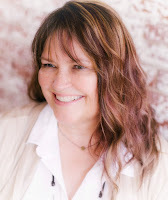 Edie Melson is a woman of faith with ink-stained fingers observing life through the lens of her camera. No matter whether she’s talking to writers, entrepreneurs, or readers, her first advice is always “Find your voice, live your story.” As an author, blogger, and speaker she’s encouraged and challenged audiences across the country and around the world. Her numerous books reflect her passion to help others develop the strength of their God-given gifts and apply them to their lives. Connect with her on her website, through Facebook, Twitter and Instagram.
Edie Melson is a woman of faith with ink-stained fingers observing life through the lens of her camera. No matter whether she’s talking to writers, entrepreneurs, or readers, her first advice is always “Find your voice, live your story.” As an author, blogger, and speaker she’s encouraged and challenged audiences across the country and around the world. Her numerous books reflect her passion to help others develop the strength of their God-given gifts and apply them to their lives. Connect with her on her website, through Facebook, Twitter and Instagram.
Published on April 29, 2024 22:00
April 28, 2024
13 Attitudes to Change if You're Struggling as a Writer
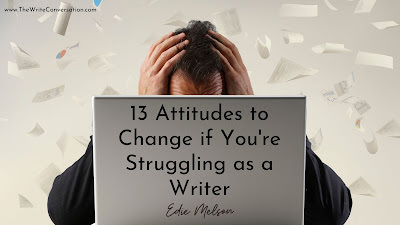
by Edie Melson @EdieMelson
Choosing to be a writer can be a daunting prospect. It involves courage, creativity, and yes, commitment. When we’re unwilling to make that commitment, we can doom ourselves to failure before we’ve had a chance to succeed.
This post isn’t meant to beat anyone up, but rather to make us aware of some of the things that could be holding us back on our writing journey.
Questions All Writers Should Ask Themselves1. Am I unwilling to write on a schedule. Notice I didn’t say write every day or write every morning. There are some who other commitments in addition to writing that make scheduling a daily writing time unreasonable. HOWEVER, we can all make a commitment to certain times during the week to write.
2. Am I unwilling to spend time writing. This seems like a no-brainer, but you’d be surprised at how creative writers can be when it comes to thinking up reasons not to write. Beyond that, you’ll find writing groups and gathers populated with scores of people who want to be writers, but have reasons why they can’t right now. The truth is we all have reasons in our lives not to take the time to write. It all boils down to priorities. We make time for the things that are most important.
3. Am I unwilling to invest in learning how to write. Talent is great, but that alone won’t get any of us to the top, or even very far above the bottom. We have to learn how to apply the talent we’ve been given. That means reading books and blogs as well as attending classes and conferences.
4. Am I unwilling or defensive about being critiqued. I’m still not the best about enjoying a good critique, but I’ve learned how to accept it. I thank the person critiquing me, and even if I don’t agree, I look it over and try to take what I can from it. Especially with in-person critiques I’ve learned that being defensive and trying to explain or justify is counterproductive.
5. Am I unwilling to join a writers group. There are those in the industry who disagree with me, but not many. I’ve found that for me, and the hundreds of writers I’ve worked with, that we’re all stronger together. We need others to encourage us along the way. We also need the perspective of those who’ve experienced what we’re going through.
6. Do I refuse to spend time reading. Our business is that of writing. How can we have perspective on the industry if we refuse to read what’s being written? Books are a valuable way to learn and polish our own writing.
7. Am I unwilling to learn the business of writing. There’s more to writing than just putting words on paper. We need to learn the language of the publishing industry. We need to learn the etiquette of the publishing industry. We need to learn the marketing and social media side of the business, and how things work.
8. Am I unwilling to be patient. Writing is a craft. It’s not something learned overnight. We often come into this business with something we’ve written and expect it to be publishable. That’s just not reasonable. A concert pianist can’t expect to be performance-ready before his first lesson, and neither can a writer.
9. Am I unwilling to submit my work. Yes we want to write with excellence. We need to do the best we can right now, but not let perfectionism get in the way of submission. There are two truths in this industry we each need to embrace:No matter how hard we try, we’ll never be perfect.No matter how much we revise the piece we’re working on now, the next one will be better.
10. Do I think everything I write is publishable. There are going to be some things we write that just don’t fit the market—any market. This doesn’t necessarily mean they’re bad. It could be the wrong time or place for such a piece. We need to know when to move on to the next thing.
11. Am I unwilling to accept advice. I don’t think we should accept every single piece of advice we receive. Likewise though, I don’t think we should ignore every single piece of advice we receive. When someone
12. I'm unwilling to stop looking at myself as the exception to the rule. There are certain ways that things are done or not done in the publishing industry. There are also exceptions to almost every single instance. But there’s a reason they’re called exceptions. It’s because those specific set of circumstances rarely happen that way. It’s fine to dream and hoped, but we also have to be diligent, disciplined and do our part to make our dreams come true.
13. Do I look at every other writer as my competition. There is plenty of work to be done. Especially as believers who write, God has room for each of us. We need to celebrate the successes of one another, share what we’re learning, and never gloat when things go well.
I’m sure this list could go on and on and on. I’m at the end for me, but I’d love to hear what you’d add. Be sure to leave your thoughts in comments section below.
Don’t forget to join the conversation!Blessings,Edie
TWEETABLE13 Attitudes to Change if You're Struggling as a Writer from @EdieMelson (Click to Tweet)
 Edie Melson is a woman of faith with ink-stained fingers observing life through the lens of her camera. No matter whether she’s talking to writers, entrepreneurs, or readers, her first advice is always “Find your voice, live your story.” As an author, blogger, and speaker she’s encouraged and challenged audiences across the country and around the world. Her numerous books reflect her passion to help others develop the strength of their God-given gifts and apply them to their lives. Connect with her on her website, through Facebook, Twitter and on Instagram.
Edie Melson is a woman of faith with ink-stained fingers observing life through the lens of her camera. No matter whether she’s talking to writers, entrepreneurs, or readers, her first advice is always “Find your voice, live your story.” As an author, blogger, and speaker she’s encouraged and challenged audiences across the country and around the world. Her numerous books reflect her passion to help others develop the strength of their God-given gifts and apply them to their lives. Connect with her on her website, through Facebook, Twitter and on Instagram.
Published on April 28, 2024 22:00
April 27, 2024
Take Heart, After a Writing Winter Spring DOES Come

by Edie Melson @EdieMelson
Sometimes we have a difficult writing winter. That’s what I call a season of writing discouragement. When that happens, it can mimic a hard winter season.
The following is what I experienced one spring, following a difficult winter.
There were a lot of dreary days and very little sun. The ground was still boggy with sticky mud and gray has been the color du jour for so long it seemed normal.
But as I glanced out the window one morning, a glint of yellow caught my eye. Sure enough the jonquils were emerging. They’d pushed their strong green stalks sunward and have begun to bloom.
After winter comes spring.
If ever there was a year I needed that reminder that was it.
As I examined these harbingers of change, I saw some things, some different insights I’d never taken note of before.
1) in spite of being surrounded by mud, they were as fresh and clean as if they’d been raised in a greenhouse.
2) They were flourishing that year, not in spite of their surroundings, but because of them. The dreary wet mess of winter brought their beauty to a crescendo much more effectively than an easy winter would have.
3) Finally, I realized they began their reach toward the sun in the midst of the winter’s hardship.
Even as I wrote my observations, I felt God’s truth soaking into my soul regarding my own hard winter with writing.
Those observations hold true for you as well as me.
1) God is the God of new beginnings. And His new start is always clean and fresh no matter what we’ve emerged from.
2) What we’ve experienced will always be with us. However, we’re all going to come through the difficulties stronger and with blessings and insights that carry us forward.
3) I’ve been reminded that moving on after difficulty doesn’t happen all of a sudden. There are tiny steps we’ve taken that have propelled us to that place. That year I didn’t remember moving, but in the dark we don’t always notice the progress.
So if you’ve experienced a long writing winter, take heart, after winter comes spring.
Blessings,Edie Melson
TWEETABLETake Heart, After a Writing Winter Spring DOES Come from @EdieMelson (Click to Tweet)
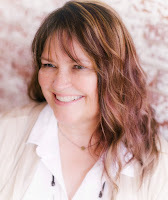 Edie Melson is a woman of faith with ink-stained fingers observing life through the lens of her camera. No matter whether she’s talking to writers, entrepreneurs, or readers, her first advice is always “Find your voice, live your story.” As an author, blogger, and speaker she’s encouraged and challenged audiences across the country and around the world. Her numerous books reflect her passion to help others develop the strength of their God-given gifts and apply them to their lives. Connect with her on her website, through Facebook, Twitter and Instagram.
Edie Melson is a woman of faith with ink-stained fingers observing life through the lens of her camera. No matter whether she’s talking to writers, entrepreneurs, or readers, her first advice is always “Find your voice, live your story.” As an author, blogger, and speaker she’s encouraged and challenged audiences across the country and around the world. Her numerous books reflect her passion to help others develop the strength of their God-given gifts and apply them to their lives. Connect with her on her website, through Facebook, Twitter and Instagram.Featured Image provided by Edie Melson Photography
Published on April 27, 2024 22:00
April 26, 2024
How to Make the Characters You Write Credible and Believable
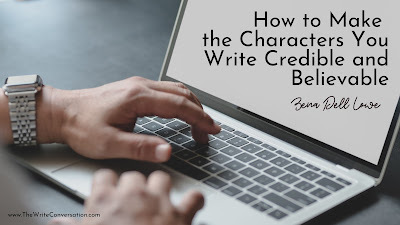
by Zena Dell Lowe @ZenaDellLowe
Believability—credibility—is one of the foundational principles of all good storytelling. The acid test of any successful story is, does it work? By “work,” I mean, does your audience buy it? Do they accept the situation and characters you’ve created as real? Do they believe what’s happening? And since the finest writing arcs or changes the inner nature of the character over the course of the telling, does your audience believe that your character is changing in a believable way?
Simply put, your audience needs to believe it. They need to be convinced that you are giving them an accurate depiction of who your character is, what they are like, and what they must accomplish over the course of the telling. Here are a few key tips to help writers enhance the credibility and believability of characters.
Number 1: Slow down. Don’t rush. Take your time.
One of the main areas to focus on is revealing true character over and against characterization. Characterization is the list of qualities that I could come up with about a person simply by watching, researching, and taking notes. These are your character's physically observable attributes. True character, on the other hand, is revealed by the choices a character makes under pressure.
One of the major ways writers undermine their own credibility is simply when they try to rush character development. You must take the time to reveal who your character is on the inside. What do they want? What do they need? Who are they really? You must take the time to show us who your character is, what qualities they possess, who their most important relationships are with, and more. These things are essential for us to emotionally invest in their journey.
In addition to this, make sure the characterizations you give your characters make sense in terms of what your character must accomplish. Your character has a goal, an objective to pursue. You must give your character the necessary qualities to convincingly act out the pursuit of that objective. Your character must be old enough or young enough, or worldly or naive enough, all in the right proportions. You must give them the characterizations that make us believe that they would or could accomplish whatever it is they’re supposed to accomplish over the course of the telling.
Number 2: If you want the audience to buy something, justify it.
In certain stories, especially where believability is stretched, it's crucial to justify the actions or abilities of characters. For example, if a seventy-year-old man is performing physical feats like Sean Connery’s character does in the “Entrapment,” the audience needs to see plausible evidence of his abilities. At one point in the film, Sean Connery attempts to escape by walking across a tightrope strung between two tall buildings, slips and dangles one-handed from the wire, and then somehow manages to hoist himself upright again, using that stellar seventy-year-old upper body strength that we’ve all heard so much about. Most people couldn't pull this off even in their prime, let alone at age seventy. If you want your audience to suspend disbelief, you need to give them a reason to do so. Show Sean Connery working out. Show his strength and agility as he practices his skills. We must be able to buy that a character could or would do whatever they end up doing, which means they need to possess the right characteristics in the first place.
But be careful, because even if you take the time justify something, it will still ring false to the audience if you’re basing your justification on a false perspective of humanity.
Number 3: Ensure behavior aligns with human nature.
When it comes to credibility, a common pitfall in storytelling is when characters' actions or transformations feel inconsistent with human behavior or previously established traits. For instance, the rushed transformation of Daenerys in "Game of Thrones" left audiences bewildered because it didn't align with her established character arc. From the beginning, Daenerys had been set-up to be the savior of the kingdom and the true heir to the throne, even though her father had gone mad and had therefore been assassinated. Still, Daenerys had never exhibited any of those characteristics – until the final season of the series. Suddenly, she attacks the Citadel on her dragon, and instead of stopping when she's supposed to, she goes nuts and starts burning the whole town. It's crazy because it’s completely out of the blue. We don't believe it. We don't buy it. They rushed her transformation. It's essential to take the time to develop and justify character behavior in a way that resonates with human nature and psychology.
Another example of this is Anakin Skywalker’s transformation into Darth Vader in "Star Wars." In episodes four, five, and six, we learn that Anakin was “seduced” by the dark side, seduced by Darth Vader, a cautionary tale for Luke to heed. However, in episodes one, two, and three, George Lucas tries to justify Anakin’s fall to the dark side by attempting to rationalize it through his desire to save his wife. This undermines the mythology we already know about Darth Vader as well as the complexity of human nature and the allure of the dark side. The fact is sin is incredibly alluring. If it wasn’t, we wouldn’t be tempted to engage in it. It was sufficient and necessary for Anakin to be seduced by the power of the dark side for its own sake. By not fully exploring the seductive power of the Dark Side, the transformation feels forced and lacks believability. To write well, we must have a true understanding of human nature.
Number 4: Approach your story with a true worldview.
If your worldview happens to be false, then you're going to miss the gold. Do you have a true view of reality? Are you in touch with your own sin nature? Do you understand what a character would or could do given a particular situation? Approaching your story with a true worldview gives you a significant advantage in credibility.
Conclusion:
Crafting believable characters involves authentically developing their traits, justifying their actions, and ensuring their behavior resonates with human nature. By doing so, writers can create stories that captivate and emotionally engage audiences.
Interested in learning more? Subscribe to my weekly podcast on YouTube, The Storyteller’s Mission with Zena Dell Lowe:https://www.youtube.com/@thestorytellersmission8256/videos. Or find me on the podcast app of your choice. Be sure to leave a review!
TWEETABLEHow to Make the Characters You Write Credible and Believable from @ZenaDellLowe on @EdieMelson (Click to Tweet)
 Zena has worked professionally in the entertainment industry for over 20 years as a writer, producer, director, actress, and story consultant. Zena also teaches advanced classes on writing all over the country. As a writer, Zena has won numerous awards for her work. She also has several feature film projects in development through her independent production company, Mission Ranch Films. In addition to her work as a filmmaker, Zena launched The Storyteller’s Mission with Zena Dell Lowe, a podcast designed to serve the whole artist, not just focus on craft. In 2021, Zena launched The Storyteller’s Mission Online Platform, where she offers advanced classes and other key services to writers. Zena loves story and loves to support storytellers. Her passion is to equip artists of all levels to achieve excellence at their craft, so that they will truly have everything they need to change the world for the better through story.
Zena has worked professionally in the entertainment industry for over 20 years as a writer, producer, director, actress, and story consultant. Zena also teaches advanced classes on writing all over the country. As a writer, Zena has won numerous awards for her work. She also has several feature film projects in development through her independent production company, Mission Ranch Films. In addition to her work as a filmmaker, Zena launched The Storyteller’s Mission with Zena Dell Lowe, a podcast designed to serve the whole artist, not just focus on craft. In 2021, Zena launched The Storyteller’s Mission Online Platform, where she offers advanced classes and other key services to writers. Zena loves story and loves to support storytellers. Her passion is to equip artists of all levels to achieve excellence at their craft, so that they will truly have everything they need to change the world for the better through story.To find out more about Zena or her current courses and projects, check out her websites at WWW.MISSIONRANCHFILMS.COM and WWW.THESTORYTELLERSMISSION.COM
Published on April 26, 2024 22:00
April 25, 2024
Five People You Might Meet at Your Next Writing Conference
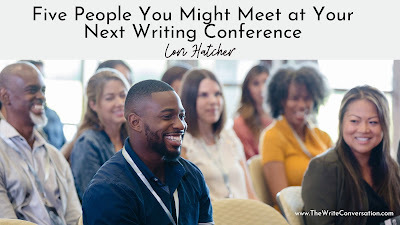
By Lori Hatcher
If you’ve ever attended a writing conference, you’ve likely met one or all of these five people.
Sadie: Sadie has loved writing since she was a teenager scribbling her thoughts into a college-ruled spiral bound notebook. She processes life through her pen and her keyboard. While her friends are talking it out, she’s writing it out—fast and furious—until she’s made sense or peace of it. Whatever it is. She knows God has wired her to write, and she’s wondering if He might want to use her writing to help someone else. She’s at the conference seeking God’s direction and the input of other writers.
Mack: Mack has retired from his “real job” but knows he still has much to offer. His relaxed schedule allows him to pursue activities he didn’t have time for when he was working full time, like writing. He’s wondering if God might want to use writing to pass on the lessons he’s learned in business and in life. He’s at the conference to find out the best way to compile his knowledge and pass it along to others.
Jess: Jess has been sharing devotional blog posts for several years. Although she has a small subscriber list, she often receives emails from readers saying how much her posts have helped them. “You should write a book,” they say. She’s at the conference to share her work with industry professionals and get objective feedback.
Mary: Mary’s been writing columns for her local newspaper for 20 years. Week in and week out, she’s been shining her light in the darkness of secular media, challenging readers to look for God in the everyday. But this year’s been hard. She lost her mom to dementia and her best friend to cancer. In the press of caregiving and grieving, she hasn’t written in a long time. “I came to the conference wondering if I was done with writing,” she admitted. “I discovered God isn’t finished with me yet.” Mary came to the conference to be refreshed.
Cassandra: Cassandra has written three books and has another in the pipeline. She’s well-connected and successful, but she knows a serious writer never stops learning. She wants to understand AI, characterization, and the best way to self-edit her work. Cassandra also knows that writing is lonely. She’s looking forward to hanging out with other writers and swapping stories—and laughing a lot. Cassandra’s at the conference to learn skills and develop relationships.
Five different writers. Five different reasons for attending a writing conference. All they're under the umbrella of Christian love and God’s calling.
Which conferee do you relate to most and why? If you’ve never attended a conference, wouldn’t you like to join us this year? If you have attended, which conference have you attended and why?
Share your thoughts in the comments below.
Upcoming Christian Writers Conferences:Blue Ridge Mountains Christian Writers Conference, Black Mountain, NC, May 26-30Write to Publish Conference, Wheaton, IL, June 11-14 (I’ll be there!)Florida Christian Writers Conference, Leesburg, FL, October 16-20 (I’ll be there!)
TWEETABLE5 People You Might Meet at Your Next Writing Conference from author Lori Hatcher on @EdieMelson (Click to Tweet)
 Lori Hatcher loves to inspire and equip others by sharing high-impact stories for spiritual transformation. A popular women’s ministry speaker and writing/speaking instructor, Lori is an Advanced Communicator Gold and Advanced Leader Bronze with Toastmasters International. She writes for Our Daily Bread, Guideposts, Revive Our Hearts, and Crosswalk.com. Check out her latest devotional, A WORD FOR YOUR DAY: 66 DEVOTIONS TO REFRESH YOUR MIND, from Our Daily Bread Publishing. Connect with her at LORIHATCHER.COM or on FACEBOOK.
Lori Hatcher loves to inspire and equip others by sharing high-impact stories for spiritual transformation. A popular women’s ministry speaker and writing/speaking instructor, Lori is an Advanced Communicator Gold and Advanced Leader Bronze with Toastmasters International. She writes for Our Daily Bread, Guideposts, Revive Our Hearts, and Crosswalk.com. Check out her latest devotional, A WORD FOR YOUR DAY: 66 DEVOTIONS TO REFRESH YOUR MIND, from Our Daily Bread Publishing. Connect with her at LORIHATCHER.COM or on FACEBOOK.
Published on April 25, 2024 22:00
April 24, 2024
Fiction Writing Tips: What Is Your Hero Pursuing?
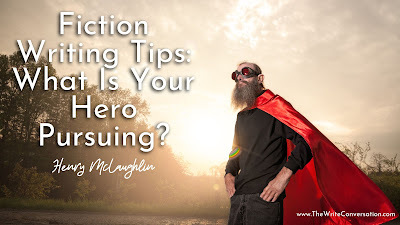
by Henry McLaughlin @RiverBendSagas
We’ve all heard story is about conflict and tension. And that is definitely true.
Stories about happy people living in Happy Valley don’t excite readers. Frankly, they can be boring.
The story becomes a story when something disrupts the status quo. As John LeCarré once said, “The cat sat on the mat is not a story. The cat sat on the dog’s mat—now that’s a story.”
Here’s another way to look at it: Stories are about the pursuit of happiness. It’s even in the Declaration of Independence. Happiness is unique to each individual.
Story is about more than resolving conflict. It’s about our hero pursuing happiness and the challenges and obstacles she must overcome. Sometimes all she wants is to return to the way things were before. Other times, she wants to correct an injustice. Still other times, it can be about rescuing someone or something of value, a rescue that entails risk and the real possibility of failure. And death. Remember, our hero must face death either physically, emotionally, psychologically, or relationally.
At the basics, we can look at a novel as two people—the protagonist and the antagonist—pursuing happiness. The plot in its simplest form is they both want happiness, but in the end only one can achieve it. And achieving it will be at the expense of the other. For example, two people are running for President of the United States. Each must overcome obstacles such as raising money, convincing voters their vision for the country is better than their opponents. Only one can win.
As Steven James wrote in his craft book, Trouble Shooting Your Novel, “Story is about more than conflict—it is desire in a specific direction.” That desire is happiness in whatever form it takes for the hero. And, as Steven wrote, “Pursuit is action with intention.”
When we’re developing our story, we need to ask what happiness is our hero pursuing? What does she have to do to get her happiness? Our responsibility as authors is to do all we can to stop her from getting there.
What is the happiness beyond our hero’s grasp? Why is it important to her? In our story, we want to focus on the concrete ways she pursues it—keep the action believable and her intention clear.
We need to establish why she seeks it. What is her motivation for the goals or purpose she is seeking to achieve at story’s end? The motivation must be believable in the context of the story. We need to avoid overly focusing on explaining the whys because will this slow our story down by making it too introspective.
How does the idea of having your hero pursue happiness change the way you look at her and how you see your story playing out?
TWEETABLEFiction Writing Tips: What Is Your Hero Pursuing? from author Henry McLaughlin (@RiverBendSagas) on @EdieMelson (Click to Tweet)
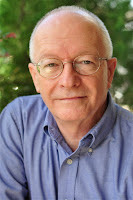 Henry’s debut novel, Journey to Riverbend, won the 2009 Operation First Novel contest.
Henry’s debut novel, Journey to Riverbend, won the 2009 Operation First Novel contest.Henry edits novels, leads critique groups, and teaches at conferences and workshops. He enjoys mentoring and coaching individual writers.
Connect with Henry on his BLOG, TWITTER and FACEBOOK.
Published on April 24, 2024 22:00



